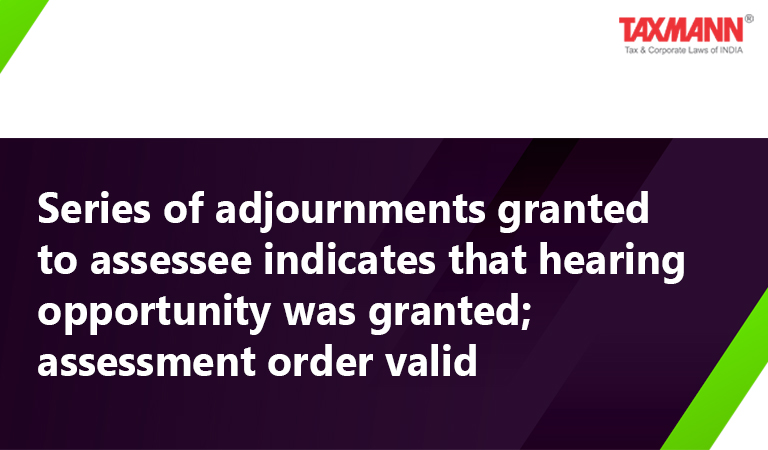Series of adjournments granted to assessee indicates that hearing opportunity was granted; assessment order valid
- Blog|News|Income Tax|
- 2 Min Read
- By Taxmann
- |
- Last Updated on 27 October, 2021

Case Details: Unisource Hydro Carbon Services (P.) Ltd. v. Union of India - [2021] 131 taxmann.com 175 (Calcutta)
Judiciary and Counsel Details
-
- Md. Nizamuddin, J.
- R.N. Dutta, Ms. Sutapa Roychowdhury and Abhijit Das, Advs. for the Petitioner.
- S.N. Dutta and Asok Bhowmik, Advs. for the Respondent.
Facts of the Case
Assessee filed the writ petition before the Calcutta High Court challenging the faceless assessment order on the alleged ground f violation of the principle of natural justice. The assessee contended that Assessing Officer (AO) didn’t grant adequate and effective opportunity of hearing to it. Since violation of natural justice is a jurisdictional error, AO had committed a jurisdictional error.
On the other hand, AO said that the assessee was granted ample opportunity to hear from time to time in the course of the assessment proceeding, which would appear from records being documents annexed to the Writ Petition.
High Court Held
The Calcutta High Court held that it was established from the record that a series of adjournments were granted on the prayer of the assessee from time to time. However, the assessee did not comply with many notices and, sometimes in response to some of the notices on some occasion, replied to the show-cause notice in detail and furnished material evidence and documents in support of its case before AO.
Considering the above fact, the assessee could not make out a case of any patent jurisdictional error or that the AO acted contrary to any specific provision of law in the course of the assessment proceeding.
Since sufficient opportunities of hearing were given to the assessee, there was no violation of principles of natural justice while passing assessment order by AO.
Case Review
-
- International Management v. National Faceless Assessment Centre [2021] 128 taxmann.com 164 (Delhi);
- Raja Builders v. National Faceless Assessment Centre [2021] 127 taxmann.com 339/280 Taxman 304 (Bom.);
- Sanjay Aggarwal v. National Faceless Assessment Centre [2021] 127 taxmann.com 637/281 Taxman 282/436 ITR 180 (Delhi)
- Hindustan Pilkington Glass Works Ltd. v. Superintendent Central Excise 1978 (2) ELT (J229) (Cal.) (para 11-15) distinguished.
List of Cases Referred to
-
- Magick Woods Exports (P.) Ltd. v. Addl./Jt./Dy./Asstt. CIT [W.P. No. 10693 (W) of 2021, dated 28-4-2021] (para 11)
- International Management v. National Faceless Assessment Centre [2021] 128 taxmann.com 164 (Delhi) (para 11)
- Suresh Kumar Lakhotia v. National e-Assessment Centre [Writ Petition (ST) No. 10639 of 2021, dated 12-5-2021] (para 12)
- Raja Builders v. National Faceless Assessment Centre [2021] 127 taxmann.com 339/280 Taxman 304 (Bom.) (para 13)
- Sanjay Aggarwal v. National Faceless Assessment Centre [2021] 127 taxmann.com 637/281 Taxman 282/436 ITR 180 (Delhi) (para 14)
- Hindustan Pilkington Glass Works Ltd. v. Superintendent Central Excise 1978 (2) ELT (J229) (Cal.) (para 15)
Disclaimer: The content/information published on the website is only for general information of the user and shall not be construed as legal advice. While the Taxmann has exercised reasonable efforts to ensure the veracity of information/content published, Taxmann shall be under no liability in any manner whatsoever for incorrect information, if any.

Taxmann Publications has a dedicated in-house Research & Editorial Team. This team consists of a team of Chartered Accountants, Company Secretaries, and Lawyers. This team works under the guidance and supervision of editor-in-chief Mr Rakesh Bhargava.
The Research and Editorial Team is responsible for developing reliable and accurate content for the readers. The team follows the six-sigma approach to achieve the benchmark of zero error in its publications and research platforms. The team ensures that the following publication guidelines are thoroughly followed while developing the content:
- The statutory material is obtained only from the authorized and reliable sources
- All the latest developments in the judicial and legislative fields are covered
- Prepare the analytical write-ups on current, controversial, and important issues to help the readers to understand the concept and its implications
- Every content published by Taxmann is complete, accurate and lucid
- All evidence-based statements are supported with proper reference to Section, Circular No., Notification No. or citations
- The golden rules of grammar, style and consistency are thoroughly followed
- Font and size that’s easy to read and remain consistent across all imprint and digital publications are applied



 CA | CS | CMA
CA | CS | CMA
